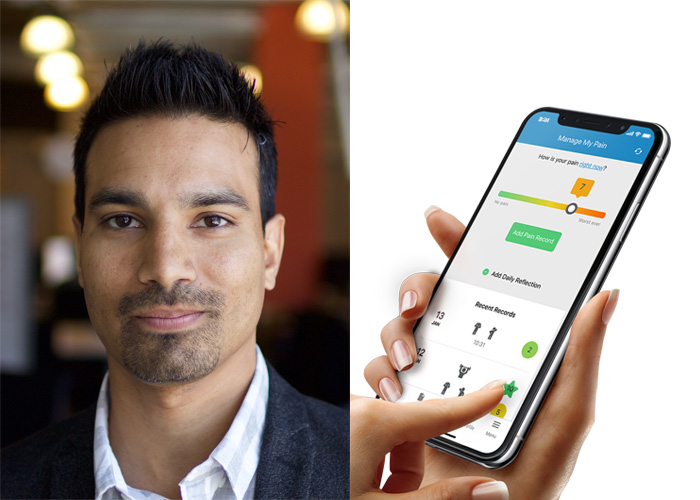
Big data holds enormous promise for improving human health. Tahir Janmohamed (Skoll CompE 0T4 + MBA 0T6) aims to harness that power — but he believes that too often the approach is completely backward.
“One of the biggest issues that I have with digital health today is that patients aren’t the ones driving the development,” he says. “Doctors and researchers are saying ‘This is the data we need’ without thinking about whether people are actually going to want to provide that data.”
Ten years ago, Janmohamed was working for a large management consulting firm, analyzing data to improve business operations. He liked his job, but he aspired to make a greater impact and had always dreamed of starting his own company.
Learn more about Janmohamed’s ‘Aha Moment’ in this video from MaRS Discovery District
Health care seemed like a good option, as it would enable him to leverage his experience in analytics. But rather than work with one of the many existing data sets, Janmohamed made the fateful decision to move into an area where data was inherently hard to get: chronic pain.
“Chronic pain is highly subjective,” he says. “There’s no blood test, no signature on an x-ray. The way it’s measured is by doctors asking their patients: how do you feel? Can you rate it from zero to 10? How has it evolved from the last time I saw you three months ago?”
Janmohamed was shocked just how few data points doctors had to make decisions about treatment. He set out to create a way to increase the objectivity, quality and frequency of this data. The result was Manage My Pain, the first pain-management app to be launched on Android’s marketplace in 2011.
From the beginning, Janmohamed was focused on ensuring that users saw value in the product. “You can design the best platform in the world, but if only one per cent of people actually use it, you’ve got nothing,” he says. “At the beginning, I didn’t talk to researchers or experts, I talked to people with pain. I asked them ‘What would make you use this?’”
Janmohamed says that entering data in the app is done once a day and takes less than a minute. Users receive detailed reports that track how their pain changes in response to factors such as their activity level, the type and amount of medication they are taking, and even the weather. The app can also produce a one-page summary that is formatted in a way that makes it easy for doctors and other medical professionals to quickly assess.
By the time he hit 100,000 downloads, Janmohamed knew it was time to leave his job and devote himself to the project. His startup, Managing Life, now has a staff of eight, including full stack developers and data scientists.
Making the transition from employee to CEO wasn’t easy. “Literally everything had to be built from scratch,” he says. “I had to learn things I had limited experience with, such as marketing and sales.”
“My advice would be that if you want to be an entrepreneur, go for it right after you finish school, because that’s when you’re going to have the most flexibility in your life. I definitely didn’t do that!”
Over the past few years, Janmohamed and his team have worked hard to refine their product and add new functionalities. They have also published research papers demonstrating how the data they collect can be used to predict certain outcomes, such as whether or not someone will have high or low pain volatility six months in the future.
The team also partnered with medical professionals to create a remote monitoring portal for patients that have been prescribed opioid painkillers, helping to ensure they don’t become dependent on the drugs. A multi-site validation study of this approach is expected to be complete by January 2020.
In the long term, Janmohamed plans to market the product to organizations that have financial incentives to better manage pain, such as insurance companies.
“Our business model is not to sell apps to people in pain,” he says. “We want the apps to be available for free. We think the ultimate outcome of our approach will be better pain management, and that helps everyone involved in care.”




